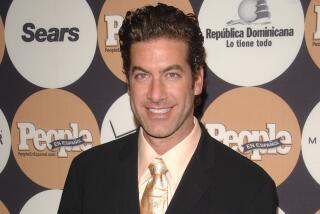The harmony of singing in a barbershop quartet
When you’re a barbershop harmonizer, the songs range from raucous comedy to sentimental tear-jerkers. You have to dance and move because you don’t just stand there and sing. And you find yourself meeting a lot of people who become close friends.
Maybe that’s why devoted barbershoppers say that once you start, you’re hooked forever.
“The real pleasure for me is making the chords and singing the music,” says Betty Snur of Palos Verdes Estates, a 12-year member of the Treble Makers, a South Bay women’s barbershop chorus.
“I keep looking for a better hobby. When I find a better one, I’ll take it,” said Ferne Hogan of North Torrance, who has been singing barbershop for 31 years. She is with another South Bay women’s chorus, the L.A. South Towns.
The 34 women of the Treble Makers--one of the South Bay’s three barbershop choruses--will show what all the excitement is about when they present a “Fascinatin’ Forties” revue twice on Sunday at the Norris Theatre for the Performing Arts in Rolling Hills Estates.
“It’s nostalgia, about the good old days,” says Snur, adding that the show takes you back in time. “The men are gone and the war is on.”
In the 2-hour show with such tunes as “You’re in the Army Now” and “Boogie Woogie Bugle Boy,” the performers recreate a number of 1940s milieus: a World War II USO canteen, a radio show with the likes of Jack Benny and Burns & Allen, and a big-band ballroom where the performers all wear sequined blue satin gowns. A tap-dance routine and a guest men’s group--the 139th Street Quartet--will round out the show.
“We care a great deal about the audience responding to the music,” said Treble Makers director Carolyn Butler, who lives on the Palos Verdes Peninsula. “It’s a very joyous experience for us, and much cheaper than a psychiatrist. Music is great therapy.”
Barbershop-style singing is a distinctively American art that developed during the 19th Century when songs had sentimental lyrics and simple melodies that could be harmonized with four voice parts. The style extended from quartets singing in barbershops to parties and picnics, and barbershop quartets became attractions in minstrel shows.
Modern barbershop choruses use the same traditional, unaccompanied harmonic style--but make a bigger sound.
“It gives a noticeable expansion of the sound,” said Herb Bayles of North Torrance, who has sung for nearly 17 years with the Coastliners, a South Bay men’s chorus. “When all are right on the money making a chorus, it’s not just a lot of guys singing together.”
Barbershoppers say trained voices are not required, but hard work is, because the harmony is precise and everyone has to sing the same words at the same time.
“Anyone who likes to sing, can carry a tune and has a good ear can do it,” said Hugh Willett of Redondo Beach, the Coastliners’ president.
Said Bayles: “A lot are like me. They never did any organized singing except six-pack harmony at a beach party or weenie roast.”
Barbershoppers say building friendships is almost as important as singing. “Big egos and irritable, nasty people don’t last long,” said Bayles. “The good folks are wonderful people. My best friends are barbershoppers.”
The choruses meet weekly to work on the music they perform at retirement and convalescent homes, churches, music festivals, community concerts--even private parties, where they earn a little pay.
The Coastliners are affiliated with the international Society for the Preservation and Encouragement of Barbershop Quartet Singing in America--also known as S.P.E.B.S.Q.S.A. The L.A. South Towns is a chapter of Sweet Adelines, the women’s equivalent of the multilettered men’s organization.
While barbershop choristers are hobbyists who sing for fun, there is a serious side to being Coastliners or South Towners. They participate in competitions, go to international conventions and teach barbershop singing.
The two groups put on sellout shows every year at the Redondo Union High School Auditorium, which the South Towns due to perform on Dec. 3. The Coastliners show is in the summer. Both perform traditional tunes such as “By the Light of the Silvery Moon” and mix in contemporary tunes sung in barbershop harmony. The shows are punctuated with comedy and choreography.
The Treble Makers, on the other hand, simply enjoy singing without contests or conventions. A year of planning and learning music has gone into the Sunday show. “It’s a challenge for us,” said Marlene Klein of Rancho Palos Verdes, the group’s president and a 16-year member. “We’re not really in show business.”
New singers are welcome at the weekly rehearsals: the Coastliners on Wednesdays, 7:30 p.m., at St. Andrew’s Presbyterian Church, Avenue D and Pacific Coast Highway, Redondo Beach; L.A. South Towns on Mondays, 7:30 p.m., at Christ the King Lutheran Church, 2706 W. 182nd St., North Torrance, and Treble Makers on Wednesdays, 1 p.m., at the Rolling Hills Estates City Hall, 4045 Palos Verdes Drive North.
Barbershopping was a dying art in the 1930s, but period movies and the nostalgia craze in recent years have helped ensure its continued popularity. So has its simplicity, barbershoppers say. Almost any song can be done in four-part harmony, and there is no need for accompaniment.
“You carry your instrument with you,” said Snur.
But vests and straw hats do add a little pizazz.
More to Read
The biggest entertainment stories
Get our big stories about Hollywood, film, television, music, arts, culture and more right in your inbox as soon as they publish.
You may occasionally receive promotional content from the Los Angeles Times.










